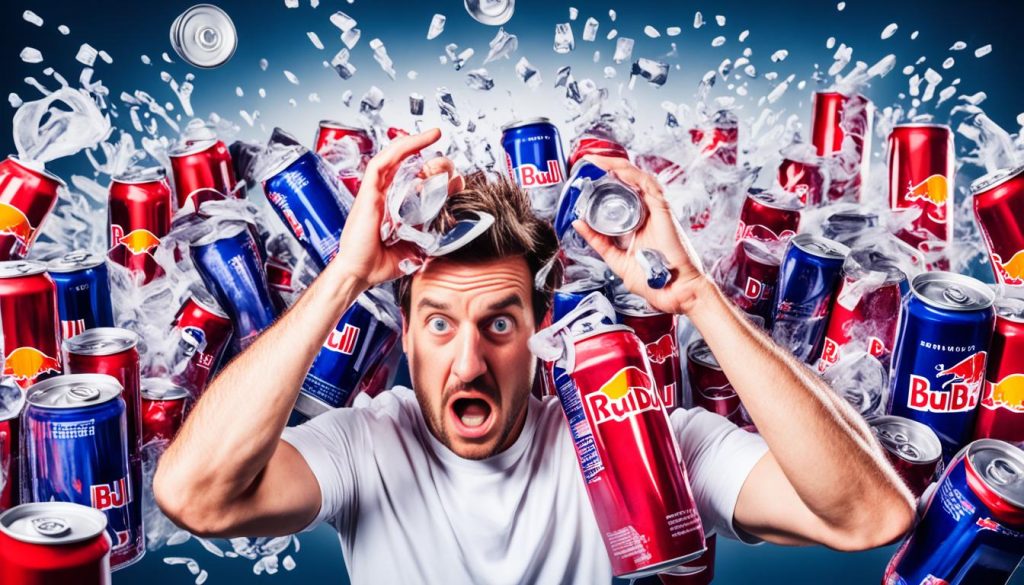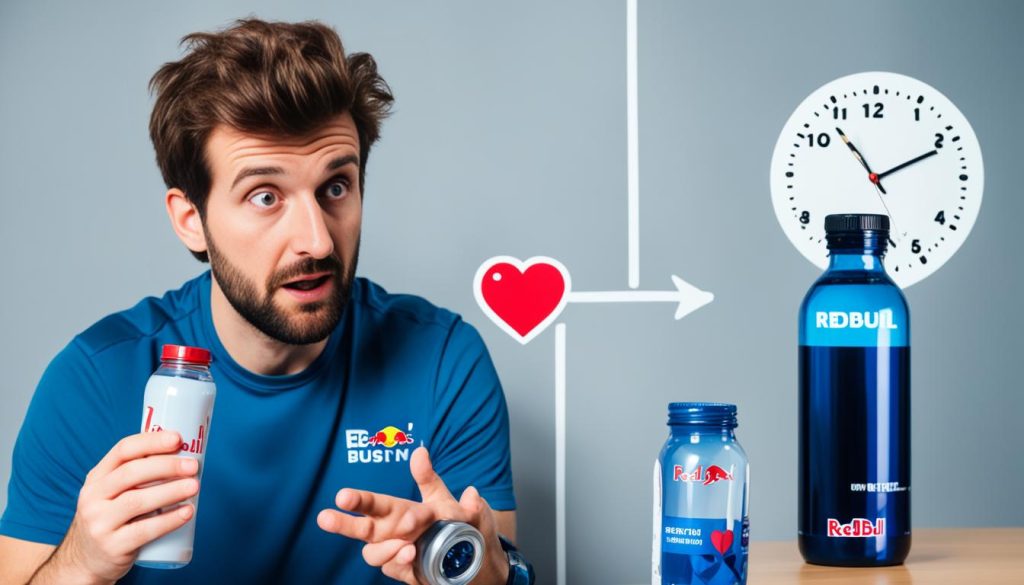Are you wondering how many Red Bulls you can safely consume in a day? It’s important to understand the recommended daily intake of energy drinks to ensure they are consumed responsibly. In this article, we will explore the daily limit of Red Bull consumption and provide valuable insights into the effects of drinking multiple Red Bulls.
The European Food Safety Authority (EFSA) recommends that healthy adults should not exceed 400 mg of caffeine from energy drinks, such as Red Bull, in a day. This is equivalent to approximately five 8.4 fl oz cans or five cups of coffee. Pregnant and breastfeeding women are advised to limit their caffeine intake to 200 mg. It is essential to be aware of the caffeine content in each can of Red Bull, which is around 80 mg, in order to manage your daily intake effectively.
Drinking multiple Red Bulls or consuming excessive amounts of energy drinks can have several negative effects on your health. These include an increase in blood pressure and heart rate, which can be risky for individuals with pre-existing cardiovascular conditions. The high sugar content in energy drinks like Red Bull can also elevate the risk of type 2 diabetes.
It is important to consider the potential health risks associated with exceeding the recommended Red Bull consumption. These risks can include elevated blood pressure, heart problems, abnormal heart rhythm, and even death, particularly among young individuals. Regular intake of energy drinks, including Red Bull, has also been linked to an increased risk of type 2 diabetes and can have detrimental effects on dental health due to their acidity.
To ensure safe consumption of Red Bull, it is recommended to follow the guidelines provided by the manufacturer. Red Bull advises consuming no more than two servings per day, which is approximately 16 ounces or 500 ml. It is crucial to read and understand the nutritional and ingredient information on the can to accurately track your caffeine intake.
Additionally, it is important to be aware of the ingredients and nutritional information of energy drinks like Red Bull. Some energy drinks offer sugar-free options, containing artificial sweeteners instead. However, regular consumption of sugar-free energy drinks may still carry potential risks and side effects.
Special considerations should be taken for specific groups when it comes to consuming Red Bull. Pregnant and breastfeeding women should limit their caffeine intake, and it is generally advised for children and teenagers to avoid or limit their consumption of energy drinks due to their high caffeine and sugar content.
In conclusion, it is essential to be mindful of your daily Red Bull consumption and adhere to the recommended guidelines. Excessive consumption of Red Bull or any energy drink can pose various health risks. It is important to prioritize sleep, proper nutrition, and other healthy habits for sustained energy and overall well-being.
How Many Red Bulls Can You Drink in a Day?
The Effects of Drinking Multiple Red Bulls
Consuming multiple Red Bulls or excessive amounts of energy drinks can have several negative effects on health. Drinking large quantities of Red Bull can lead to an increase in blood pressure and heart rate, which can pose a risk for individuals with pre-existing cardiovascular conditions. This can be particularly concerning for people who are unaware of the effects of consuming too many energy drinks.
In addition to the cardiovascular effects, high sugar content in energy drinks like Red Bull can also increase the risk of type 2 diabetes. These beverages are often packed with added sugars, which can contribute to weight gain and insulin resistance over time.
It is important to note that energy drinks, including Red Bull, can have a negative impact on dental health due to their acidity. The high levels of acid can erode the tooth enamel, leading to tooth decay, sensitivity, and other oral health issues. This means that regular consumption of energy drinks without proper oral hygiene practices can significantly harm dental health.
Furthermore, excessive consumption of energy drinks may have adverse effects on kidney health. The combination of high caffeine and sugar levels, along with other additives, can put a strain on the kidneys and potentially lead to kidney damage or dysfunction. People with existing kidney conditions or those at risk should exercise caution when consuming energy drinks in excess.
Another significant concern is the potential for engaging in high-risk behaviors when consuming energy drinks, especially when mixed with alcohol. Energy drinks mask the effects of alcohol, leading individuals to drink more without feeling the typical signs of intoxication. This can increase the risk of alcohol poisoning, impaired judgment, and dangerous behaviors.

In summary, consuming multiple Red Bulls or excessive amounts of energy drinks can have several detrimental effects on health. These include increased blood pressure and heart rate, elevated risk of type 2 diabetes, negative impact on dental health, potential kidney damage, and increased vulnerability to high-risk behaviors when combined with alcohol. It is crucial to be aware of these dangers and consume energy drinks in moderation, if at all.
Potential Health Risks of Exceeding Red Bull Consumption
Drinking excessive amounts of Red Bull or any energy drink can have significant health risks. It’s important to be aware of the potential dangers associated with consuming too many energy drinks to make informed decisions about your health.
Elevated Blood Pressure and Heart Problems
Excessive intake of Red Bull and other energy drinks can lead to an increase in blood pressure and heart rate. This can be particularly risky for individuals with pre-existing cardiovascular conditions. The stimulant properties of energy drinks can strain the heart and negatively impact cardiac health.
Risk of Abnormal Heart Rhythm, Heart Attack, or Death
Consuming excessive amounts of Red Bull and other energy drinks, especially in young individuals, can lead to abnormal heart rhythm, heart attack, or even death. Higher caffeine doses found in excessive energy drink consumption can have significant adverse effects on heart function, putting individuals at serious risk.
Increased Risk of Type 2 Diabetes
Energy drinks like Red Bull are known for their high sugar content, and regular intake of these drinks has been associated with an increased risk of type 2 diabetes. Consuming large quantities of sugar can negatively affect blood sugar levels and insulin sensitivity, contributing to the development of diabetes.
Damage to Tooth Enamel
The acidity of energy drinks, including Red Bull, can damage tooth enamel over time. Regular and excessive consumption can lead to tooth erosion, increased tooth sensitivity, and dental problems. It’s important to consider the potential impact on dental health when consuming energy drinks.
Impact on Kidney Health
Excessive intake of energy drinks can potentially have adverse effects on kidney health. The high caffeine content, along with other ingredients found in energy drinks, may lead to increased stress on the kidneys and potentially contribute to kidney problems with prolonged use.
Increased Likelihood of High-Risk Behaviors
Energy drinks, when consumed in excess or combined with alcohol, can increase the likelihood of engaging in high-risk behaviors. The stimulating effects of energy drinks may lead to a false sense of alertness, potentially leading to risky activities and impaired judgment.
| Risk Factors | Potential Health Risks |
|---|---|
| Elevated Blood Pressure and Heart Problems | Increased risk of heart conditions |
| Risk of Abnormal Heart Rhythm, Heart Attack, or Death | Potential fatalities, especially in young individuals |
| Increased Risk of Type 2 Diabetes | Greater likelihood of developing diabetes |
| Damage to Tooth Enamel | Increased risk of dental problems and tooth erosion |
| Impact on Kidney Health | Potential kidney problems with prolonged use |
| Increased Likelihood of High-Risk Behaviors | Engagement in risky activities, impaired judgment |
Red Bull Consumption Guidelines
To ensure safe consumption of Red Bull, it is crucial to follow the guidelines provided by the manufacturer. Red Bull advises individuals to limit their intake to no more than two servings per day. This recommendation translates to approximately 16 ounces or 500 ml of Red Bull.
When consuming Red Bull, it is essential to read and understand the nutritional and ingredient information provided on the can. This information allows you to track your caffeine intake accurately and make informed decisions about your consumption.
If you have underlying health conditions such as heart disease or high blood pressure, it is advisable to consult a healthcare professional before consuming Red Bull or any other energy drink. They can provide personalized guidance and ensure that your caffeine intake aligns with your health needs.
Remember, moderation is key when it comes to energy drink consumption. By adhering to Red Bull’s consumption guidelines and considering your individual health circumstances, you can enjoy Red Bull responsibly.

| Red Bull | |
|---|---|
| Caffeine Content per serving | 80 mg |
| Maximum Servings per day | 2 |
| Recommended Daily Intake | Approximately 16 ounces or 500 ml |
Ingredient and Nutritional Information
When choosing energy drinks like Red Bull, it is essential to have access to comprehensive ingredient and nutritional information. The majority of energy drinks, including Red Bull, are labelled as beverages and are required to disclose their ingredient list and nutritional facts. By carefully reviewing and understanding this information, you can make informed choices about your caffeine and sugar intake.
Red Bull provides detailed information about its ingredients and nutritional content on its packaging. Knowing the specific ingredients can help you identify any substances that you may be sensitive to or wish to avoid. It is particularly important to be aware of the caffeine content in Red Bull if you are monitoring your intake.
Red Bull Ingredients
The ingredients in Red Bull align with industry standards and include:
| Ingredients | Amount per serving |
|---|---|
| Caffeine | 80mg |
| Taurine | 1000mg |
| B Vitamins | Varying amounts |
| Sugar (regular Red Bull) | 27g |
| Artificial Sweeteners (sugar-free Red Bull) | Contains artificial sweeteners instead of sugar |
It’s worth noting that sugar-free Red Bull is available as an alternative option. These variants contain artificial sweeteners instead of sugar. However, it is important to understand that regular consumption of sugar-free energy drinks may still have potential risks and side effects, such as an increased risk of type 2 diabetes.
By reviewing the ingredients and nutritional information, you can make informed decisions about your energy drink choices based on your dietary preferences or health concerns.

Understanding the ingredients and nutritional content of Red Bull can empower you to make choices that align with your health goals and preferences. Whether it’s considering the caffeine content, sugar content, or the presence of artificial sweeteners, being informed allows you to tailor your energy drink consumption to your individual needs.
Special Considerations for Specific Groups
When it comes to consuming Red Bull or any energy drink, special considerations must be taken for specific groups. Pregnant and breastfeeding women, as well as children and teenagers, should be cautious about their caffeine intake.
Red Bull and Pregnancy
During pregnancy, it is important for women to limit their caffeine intake, including that from Red Bull. The general recommendation for pregnant women is to consume less than 200 mg of caffeine per day. It is advisable to consult a healthcare professional to determine the appropriate caffeine limits for individual circumstances.
Red Bull and Kids
Children and teenagers should avoid or limit their consumption of energy drinks like Red Bull. These beverages typically contain high levels of caffeine and sugar, which may not be suitable for young individuals. It is crucial to instill healthy habits and provide alternatives to energy drinks to ensure the well-being of children and teenagers.
Red Bull and Breastfeeding
While breastfeeding, it is important for women to be mindful of their caffeine intake, including that from Red Bull. Caffeine can pass through breast milk and affect the baby’s sleep patterns and overall well-being. It is advisable to limit caffeine consumption and consult a healthcare professional for specific guidance on caffeine intake during breastfeeding.
For all individuals, but especially for pregnant and breastfeeding women and children, it is crucial to prioritize a balanced and nutritious diet, regular exercise, and adequate sleep for sustained energy and overall well-being. Consultation with healthcare professionals is recommended for personalized guidance regarding energy drink consumption in specific situations.

Conclusion
In conclusion, it is crucial to be mindful of your daily Red Bull consumption and adhere to the recommended guidelines. Consuming excessive amounts of Red Bull or any energy drink can pose various health risks, including increased blood pressure, heart problems, and an elevated risk of type 2 diabetes.
It is recommended to limit Red Bull intake to no more than two servings per day and to monitor your overall caffeine intake from all sources. Individuals with underlying health conditions, pregnant or breastfeeding women, and children should exercise caution and consult healthcare professionals for personalized recommendations.
Prioritizing adequate sleep, proper nutrition, and other healthy habits is essential for sustained energy and overall well-being. By making informed choices and following safe energy drink intake practices, you can maintain a balanced lifestyle while enjoying the occasional boost from Red Bull or other energy drinks.




